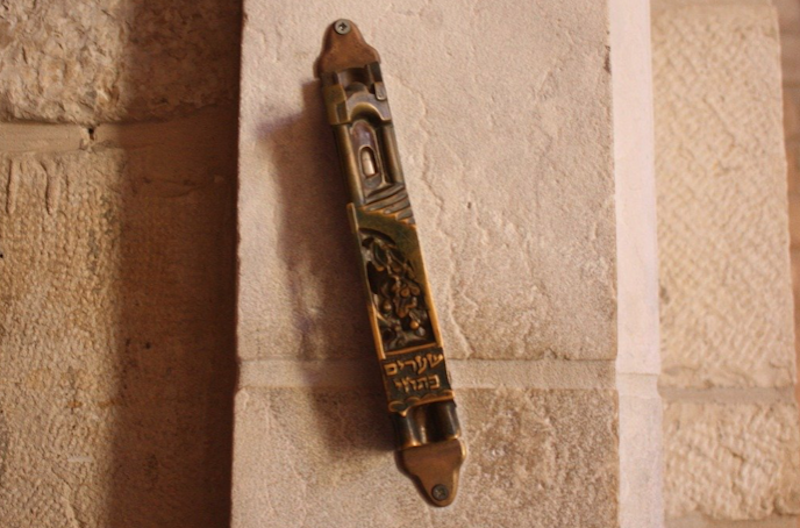The word mezuzah in Hebrew means “doorpost.” It refers to an ornamental case affixed to the right doorframe on Jewish homes. Jewish families mark their houses in fulfillment of a commandment appearing twice in the Torah that prayers should be written “upon the doorposts of your house and upon your gates.” The mezuzah is the dividing line between the chaos of the outside world and the sanctity inside a Jewish home.
What matters most about a mezuzah is what’s found inside. Each mezuzah contains a small scroll of parchment (k’laf) with a prayer called the Sh’ma (found in Deuteronomy). The Sh’ma translates to “Hear, O Israel; The Lord our God, the Lord is one.” This is the central tenet of Judaism, a belief in the oneness and singularity of God. Observant Jews recite the Sh’ma twice daily. It’s not merely an acknowledgement that there’s only one God but that every particle of existence is a manifestation of God’s essence. (Jesus considered the Sh’ma to be the first of his two greatest commandments, the second being “Thou shalt love God with all thy heart.”)
While a mezuzah isn’t biblically mandated to ward off evil, it hearkens back to Passover when Moses freed the Israelites from bondage under Pharaoh. God pronounced 10 plagues on the Egyptians including the death of their firstborn sons. God commanded the Jewish people to mark their own doorposts with the blood of a sacrificial lamb so the Angel of Death would pass over them allowing their children to live.
When I was a boy, our family had two mezuzahs. One was beside the front door, the other on the door leading to my parents’ bedroom. Every night my father covered his eyes and said his prayers before kissing the bedroom mezuzah and going to sleep. I asked him what a mezuzah meant to him. He said, “It means God lives in our house.”
My childhood neighborhood was nicknamed “Hebrew Heights.” Most local families were secular Jews who spent more time in delis than synagogues. All had mezuzahs on their front doors. Guests reflexively kissed the mezuzah above our doorbell before entering our house. Even non-Jewish friends partook in the practice. Once, Sammy Davis Jr. attended a family barbecue (my father edited one of his tv specials). Before stepping into our home, he blew a kiss toward the doorpost then said, “That is one wild and funky mezuzah.”
When I moved into my first apartment during college, I nailed a mezuzah beside the front door. This was strange since I wasn’t religious. One of my roommates was an agnostic. He asked what the mezuzah meant. I told him it protected our home from evil. He lectured me on the absurdity of religious totems saying they were nothing more than silly superstitions. I couldn’t refute his argument though I insisted on keeping the mezuzah since “it can’t hurt.”
Throughout my life I’ve kept a mezuzah next to the front door wherever I’ve lived. During the first year of the pandemic, I weathered an encounter with a mentally distraught neighbor who terrorized my wife and me. The woman placed broken glass under our tires, sprayed turpentine into our vents and tried to poison our cat. Yet her most horrifying action was removing the parchment scroll inside our mezuzah. When I shared this with my Jewish friends they reacted in horror.
During the Middle Ages, many Jewish homes were built of stone. Mezuzahs fit between the crevices of the stone causing them to hang at an angle. Jews today are told to hang their mezuzahs at an angle for the sake of tradition. The important thing is to affix the mezuzah vertically so the top points toward God. The Talmud dictates the mezuzah should be placed on the right side of the door, two-thirds of the way up.
The Hebrew letter “shin” (resembling a W) appears on the face of a mezuzah. “Shin” is the first letter of the Hebrew word Shaddai meaning “almighty, the guardian of Israel’s doors.” The 12th-century Jewish sage Maimonides wrote, “Whenever one enters or leaves a home with a mezuzah on the doorpost, he will be confronted with the declaration of God’s unity and will be aroused from his foolish absorption in temporal vanities. He will realize that nothing endures for all eternity save knowledge of the Ruler of the Universe.”
A mezuzah should be checked twice every seven years to make sure the parchment prayer is still legible. If a mezuzah falls off a doorpost, a bracha (blessing) must be uttered before affixing a new mezuzah. The old mezuzah should be given to charity.
There’s an oft-told joke about a mezuzah. A Jewish man buys a new home and hires a non-Jewish designer to decorate it. The homeowner asks the designer to place a mezuzah on the right side of the door and then worries that the designer will not affix the mezuzah correctly. When he comes home he sees it’s perfectly positioned beside the door. The decorator tells him, “I work in a lot of Jewish homes and I’ve become quite an expert at putting up mezuzahs. I don’t even need to use the instructions inside the mezuzah, I just throw them away!”
Each mezuzah contains the Hebrew word v’ahavta meaning love. The parchment inside a mezuzah reminds us to love God and to love others, inside and outside our home. This isn’t merely a suggestion but a commandment. It’s our responsibility to practice and share our love with our neighbor the way God shares His love with us.

